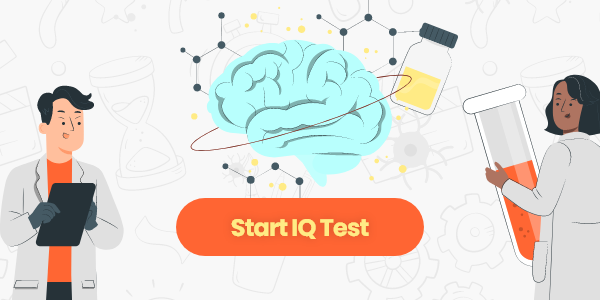5 min read
February 1, 2023
What Is a Normal IQ – And Why Exactly Does IQ Matter?
You’ve ever found yourself wondering, what is a normal IQ? The Intelligence Quotient is a score that translates to one’s measure of reasoning ability and cognitive intelligence. Since this score can assess an individual’s intelligence, one can use it to deduce how an individual uses information and logic to predict circumstances and answer questions.
Knowing your IQ score could be a benefit when it comes to settling into the right workplace, landing a suitable education placement, and building economic success.
You can find out your IQ online here.
So, what is a normal IQ? Individuals with high IQs are primarily drawn to highly complicated occupations and professions such as neuroscience, physics, or engineering.
This article seeks to evaluate the role of IQ, particularly in intellectual abilities. After reading this article, you’ll understand the relationship between IQ and success in life and ways to improve your IQ. We shall focus on understanding what is a normal IQ in the first part of this article, while the second part will answer any additional questions you may have concerning Intelligence Quotient.
Table of Contents
So, what is a normal IQ? Individuals with high IQs are primarily drawn to highly complicated occupations and professions such as neuroscience, physics, or engineering.
What Is IQ?
In the most basic terms, the intelligence quotient refers to an individual’s measure of intelligence. These scores are usually derived from results obtained from specifically designed tests.
Who Should Use IQ Tests?
Through standardized testing, individuals can learn their IQ scores and determine how this translates to their daily lives. It’s a great way to gauge one’s reasoning ability. Individuals can also deduce the areas that need improvement and boost their IQ levels through proper intellectual training.
Why Are IQ Scores Important?
IQ scores are essential as they can help evaluate your progress and status in life in terms of problem-solving abilities, decisiveness, innovation levels, social intelligence, and ability to undertake and complete a task.
One of the significant advantages of knowing your IQ is the ability to adjust to roles that suit your level of intelligence. By evaluating your strengths and weaknesses, you can better focus your energy on what makes you efficient and improve on the lacking areas.

What Is a Normal IQ?
Over time, IQ scores have significantly changed to accommodate cultural norms and racial and gender statuses to eliminate social biases. Many IQ tests use 100 as the average IQ score. The IQ tests use a mean of 100 and a standard deviation of 15, which allows for comparison between different groups of people and across time.
A normal IQ score will typically be between 85 and 115.
What Is Considered a High IQ?
Anything lower than 100 is considered relatively lower than average. About 98% of individuals have an IQ score of below 130. A score of 130 and higher is regarded as a high IQ.
Albert Einstein and Stephen Hawking are two of the most famous individuals known for having high IQ scores, with an estimated average of 160. They are known for their exceptional mathematical abilities and made significant contributions to their fields.
Related: Albert Einstein IQ
How Is IQ Measured?
IQ is measured based on several factors recommended by professionals, including the Stanford-Binet and Wechsler series.
These factors include verbal intelligence, processing speed, memory, and verbal and visual reasoning skills. Based on an individual’s characteristics, the results of an IQ test can reveal information on an individual’s strengths and weaknesses.
Related: What Is IQ test?
What Are the Signs of a High IQ?
High IQ levels are seen to positively correlate with several essential variables in real life, including high levels of success in Academics and the workplace, better relationships, including marital life, and increased lifetime earnings and accumulated wealth.

Which Activities Can Boost Your IQ?
Consistently engaging in mentally stimulating exercises may result in a higher IQ over time. Since IQ is a significant marker of intelligence, it would be beneficial to try out the following activities:
Memory Training Activities
These activities improve your memory capacity and enhance your language and reasoning skills. Memory games and challenges increase your knowledge and understanding of objects and concepts. You can achieve better reasoning and language skills through games like sudoku, crossword, jigsaw puzzles, and concentration games such as chess.
Executive Control Activities
Executive control refers to controlling complex cognitive activities and high-order functions. These include decision-making, managerial tasks, organizing, and maintaining attention. Activities such as scrabble, brainteasers, and Pictionary can result in improved levels of fluid reasoning.
Other avenues you can explore to improve your IQ levels include learning new languages, taking up musical instruments, increasing reading habits, and participating in visuospatial reasoning activities to improve reasoning and processing speed.
Relationship Between IQ and Life Success
People who score higher on IQ tests tend to do better in the conventional life success measures. Be it in academics, economic achievements, or longevity. A higher IQ has been seen to indicate high motivation towards achieving higher success and the ability to face challenges. Harnessing this motivation may be critical to the individual’s success in life.
Nevertheless, whereas there is some correlation between high IQ and success, it’s not a direct or guaranteed relationship. While people with high IQ may have a greater potential for success due to their cognitive abilities, success in life is also determined by other factors. For example, personality, emotional intelligence, social skills, education, hard work, and luck can also play a significant role.
Things To Note About IQ
IQ is a much deeper concept than categorizing people above and below an average score. Contrary to the widely held belief that one’s IQ is fixed, studies show that the score is only an intelligence measurement used to compare different reasoning capabilities on a scale.
The results of an IQ test determine one’s performance in the test in relation to the performance of the chosen control group. This means an individual could have different IQ scores depending on the population.
Additionally, despite the numerous tests that indicate that intelligence is inherent, individuals can increase their intellectual capacity regardless of their genetic history. Through activities such as learning, individuals can improve their cognitive abilities resulting in a different IQ.
How To Calculate Your IQ
Alfred Binet, the founding researcher for Intelligence Quotient, came up with a simple method to determine individual intelligence. The equation reads: IQ= Mental Age/ Chronological Age x 100.
Related: 21 Best free IQ test
Main Takeaways
Intelligence quotient, or IQ in short, is derived from standardized tests that measure human intelligence and intellectual potential. The average IQ score in the world is typically 100.
Several IQ standardized tests have been specially designed depending on the chosen control group, including the Stanford-Binet Intelligence Scale and Wechsler intelligence scale.
You can raise your IQ by working on a few factors, such as nutrition, regular learning, musical training, and new skills. However, an IQ score is not an absolute measure of intelligence, as it may fail to incorporate other strengths, such as creativity, networking abilities, emotional intelligence, and social intelligence.
It’s important to note that IQ scores are just one measure of intelligence and do not provide a complete picture of a person’s abilities and potential. A well-rounded set of skills, and adaptability to changing circumstances, are also vital in being successful in life.
Related Content
- What Is the Wechsler Adult Intelligence Scale?
- What is Mensa IQ Test?
- Intelligence test vs. emotional intelligence test
Meet Amphy
The largest marketplace for live
classes, connecting and enriching
humanity through knowledge.
Related Articles

